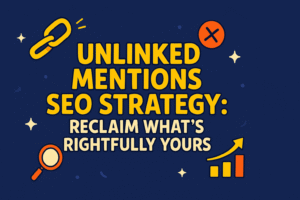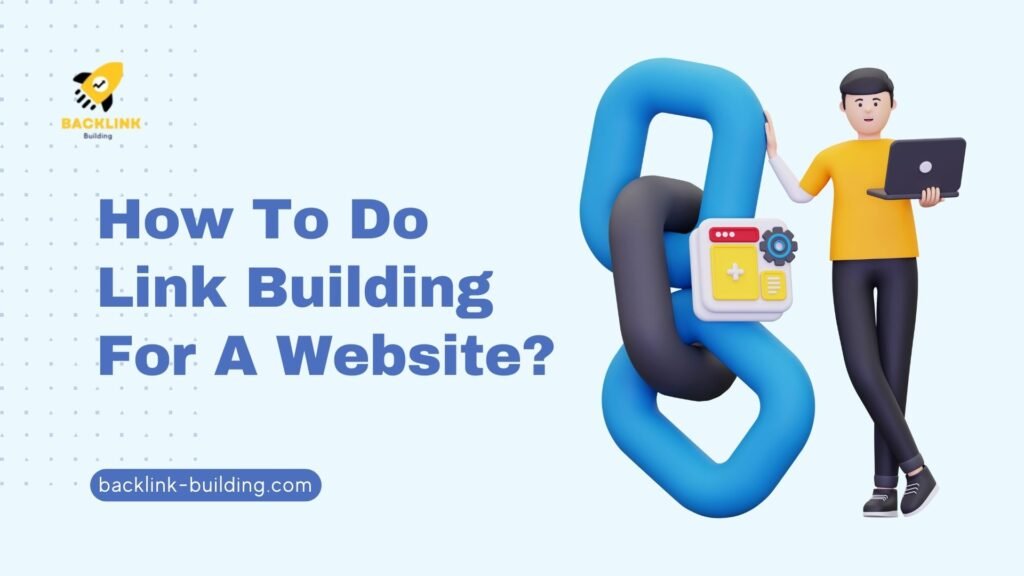
How To Do Link Building For A Website? Link building is one of the most important aspects of SEO, and knowing where to start cannot be easy. In this blog post, we will discuss how to do link-building for a website. We will cover the links you can build and how to structure your hyperlinks for the best results. We will also examine how links affect search engine rankings and how all links are not created equal. Finally, we will provide a few ways for you to generate links for your website! By the end of this blog post, you will have everything you need to start link-building for your website. So let’s get started!
The first thing we need to do is understand links and how they work. A link is simply a connection between two pieces of content on the Internet. When you click on a link, it takes you from one piece of content (the source) to another (the target). The target can be on the same website as the source or entirely on a different website.
Links are essential for search engines because they help them understand how websites are connected. This information is used when determining which websites should rank for specific keywords. Generally, websites with more links rank higher than those with fewer links. However, it is essential to note that not all links are created equal! The quality of a link is much more important than the quantity.
Now that we understand how links work and why they are essential for SEO, let’s look at the types of links you can build.
What Is Link Building?
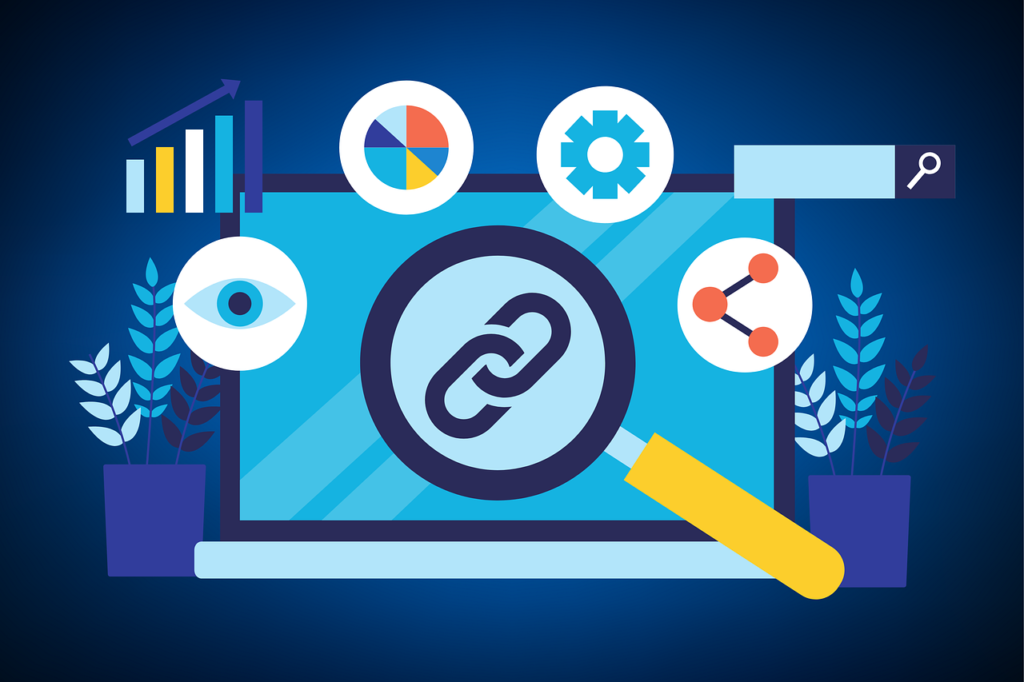
Link building is a core aspect of search engine optimization (SEO) that involves acquiring hyperlinks from other websites to your own. These hyperlinks, often called backlinks or inbound links, are essential because they signal to search engines the relevance, authority, and trustworthiness of your website. Here’s a breakdown of what link-building entails:
- Acquiring Backlinks: Link building techniques involve actively seeking and acquiring links from other websites on your own. These links serve as pathways for users to navigate between different web pages and signal to search engines the importance and popularity of your content.
- Improving Search Engine Rankings: Search engines like Google consider backlinks to be one of the critical factors in determining a website’s authority and relevance for specific search queries. Websites with a strong backlink profile are more likely to rank higher in search engine results pages (SERPs) for relevant keywords and phrases.
- Building Authority and Trust: Backlinks from reputable and authoritative websites endorse your content. When other websites link to yours, it indicates that your content is valuable and worth referencing. This helps build credibility, authority, and trust with users and search engines.
- Enhancing Website Visibility: Effective SEO link building can increase your website’s visibility and reach. Attracting backlinks from relevant and authoritative sources can expose your content to new audiences and drive targeted traffic to your site.
- Establishing Relationships: Link building strategies often involve relationships with other website owners, bloggers, influencers, and industry leaders. Cultivating these relationships can lead to collaboration opportunities, guest blogging opportunities, and natural backlink acquisitions that benefit both parties.
- Generating Referral Traffic: Backlinks improve your website’s search engine rankings and generate referral traffic from other websites. Users who click on backlinks to visit your site contribute to overall website traffic and engagement metrics.
- Earning Editorial Links: Editorial links are backlinks that are naturally acquired by creating high-quality, valuable content. Unlike manipulative link-building tactics, editorial links are based on merit and genuine interest from other website owners and publishers.
There are two main types of link building:
- Internal Link Building
- External Link Building
Internal Link Building
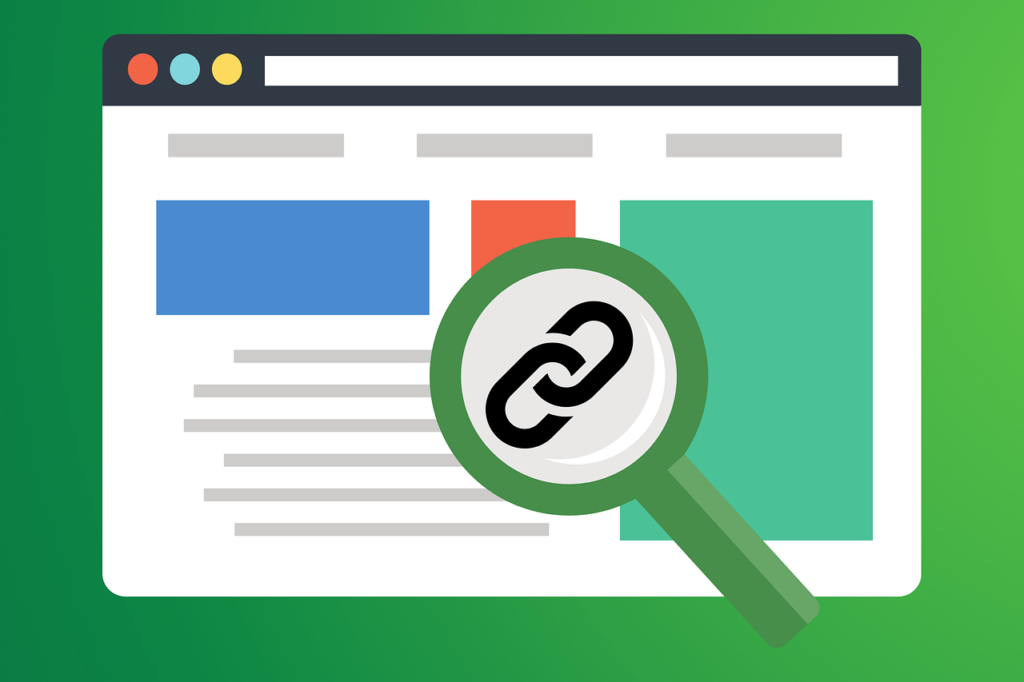
Internal link building is a crucial aspect of website optimization that involves linking pages within your site. This practice enhances user experience by guiding visitors to relevant content and helps search engines crawl and index your site more effectively. Here are some strategies for effective internal link-building:
- Create Relevant Anchor Text: Use descriptive and keyword-rich anchor text when linking between pages. Anchor text provides context to users and search engines about the linked page’s content. However, avoid over-optimization and ensure your anchor text flows naturally within the content.
- Prioritize User Experience: Internal links should enhance the user experience by providing additional information, resources, or related content that aligns with the visitor’s interests or needs. Consider the user’s journey and strategically place internal links where they add value and context to the content.
- Utilize Site Architecture: Organize your website’s structure logically and hierarchically to facilitate internal linking. A well-structured site architecture makes it easier for users and search engine crawlers to navigate different sections and discover relevant content seamlessly.
- Link to Important Pages: Identify and prioritize key pages, such as cornerstone content, product pages, or landing pages, that you want to rank higher in search results. Internally link to these pages from other relevant pages within your site to distribute link equity and signal their importance to search engines.
- Create Topic Clusters: Group related content into topic clusters or silos, with a central pillar page serving as the cornerstone. Internal linking between cluster content and the pillar page helps establish topical relevance and strengthens the authority of the entire cluster in search engine rankings.
- Audit and Optimize Existing Links: Regularly audit your website’s build links to identify opportunities for optimization and improvement. Ensure all links are functional and point to relevant and authoritative content within your site.
- Use Breadcrumbs: Implement breadcrumb navigation on your website to provide users with clear paths to navigate through different levels of content hierarchy. Breadcrumbs enhance user experience and improve search engine crawlability and indexability.
- Create Sitemaps: Generate XML sitemaps to provide search engines with a comprehensive list of your website’s pages and their relationships. Sitemaps help search engine crawlers discover and index internal links more efficiently, especially for large or complex websites.
- Monitor Performance: Track the performance of your internal links using web analytics tools such as Google Analytics or Google Search Console. Analyze metrics such as click-through rates, bounce rates, and conversions to assess the effectiveness of your internal linking strategy and make data-driven optimizations.
External Link Building

External link building, or backlinking, is acquiring links from other websites to your own. It’s a critical component of SEO because search engines consider backlinks as a vote of confidence and authority for your site. Here are some effective strategies for external link-building:
- Create High-Quality Content: Producing valuable, informative, and unique content is the foundation of any successful link-building strategy. Content that stands out will attract natural backlinks from other websites. Focus on creating content that solves problems, provides insights, or entertains your target audience.
- Guest Blogging: Writing guest posts for other websites in your niche is an effective way to earn backlinks. Look for reputable blogs or websites that accept guest contributions and offer to provide high-quality content relevant to their audience. Ensure your guest posts include a brief author bio with a link to your site.
- Broken Link Building: Identify broken links on other websites within your niche and reach out to webmasters with suggestions for replacement content from your site. Offer your content as a valuable resource to fill the gap left by the broken link. This approach can help you earn backlinks while providing a solution to the website owner.
- Resource Link Building: Create comprehensive resources, guides, or tools that provide value to your target audience. Promote your resources to relevant websites, blogs, and online communities, encouraging them to link to your content as a helpful reference.
- Skyscraper Technique: Find popular content in your niche with many backlinks, create similar but superior content, and reach out to the websites linking to the original content, suggesting they link to your improved version instead. This method leverages existing link opportunities while adding value to the conversation.
- Influencer Outreach: Build relationships with influencers, bloggers, and industry leaders in your niche. Engage with them on social media, share their content, and offer genuine support. Once you’ve established rapport, you can request backlinks or collaborations that benefit both parties.
- Content Syndication: Syndicate your content to reputable platforms, such as Medium, LinkedIn, or industry-specific forums and communities. While syndicated content may not always include backlinks directly to your site, it can increase your content’s visibility and attract organic backlinks over time.
- Local Citations and Directories: Ensure your business is listed accurately in local directories, review sites, and industry-specific directories. While these links may carry less weight than editorial backlinks, they can help improve your site’s visibility in local search results.
- Monitor and Analyze Backlinks: Regularly monitor your backlink profile using Ahrefs, Moz, or SEMrush tools. Identify new backlink opportunities, assess the quality of existing links, and disavow any spammy or irrelevant backlinks that could harm your site’s reputation.
Structure Of Hyperlink

When creating a hyperlink, you should keep a few things in mind.
- You need to ensure that your link is relevant to the content on the page. If it is not, it will likely be ignored by both users and search engines.
- Use keywords in your anchor text (the text that appears when you hover over a link). This helps Google understand your website and can improve your rankings for those keywords.
- We need to ensure that your links are fixed. A broken link is a link that goes to a page that does not exist. This can happen if the target website changes its URL or removes the page altogether. Broken links can hurt your SEO, so checking for them regularly and fixing them as soon as possible is vital.
Managing The Backlink
After you have built the backlink, it is also essential to monitor it. This can be done using a tool like Ahrefs. It would help if you ensured the links are still there and are not spammy or low-quality. If you find that the links are gone, or they are sp, you need to take action and remove them.
What Do Links Mean For Search Engines?
As we mentioned, links are how search engines understand how websites are connected. This information is used when determining how to rank websites for specific keywords.
Do All Links Have The Same Weightage?
No, not all links are created equal. The quality of a link is much more important than the quantity. A high-quality link is from a website that is relevant to your website and has high traffic. A low-quality link is from a website that is irrelevant to your website or has little traffic.
Link Building Isn’t Enough
Link building is an ongoing process that should be a part of your overall marketing strategy. Even if you have built links to your website, your job must still be completed. You need to continue building links and promoting your website to see results.
How To Resolve Spammy Links
You must remove those links if you have been using old-school link-building techniques or are considered spammy. You can do this using a tool like Google’s Disavow Tool. Once you have removed the links, you must build high-quality links from websites relevant to your niche.
How To Do Link Building For A Website?
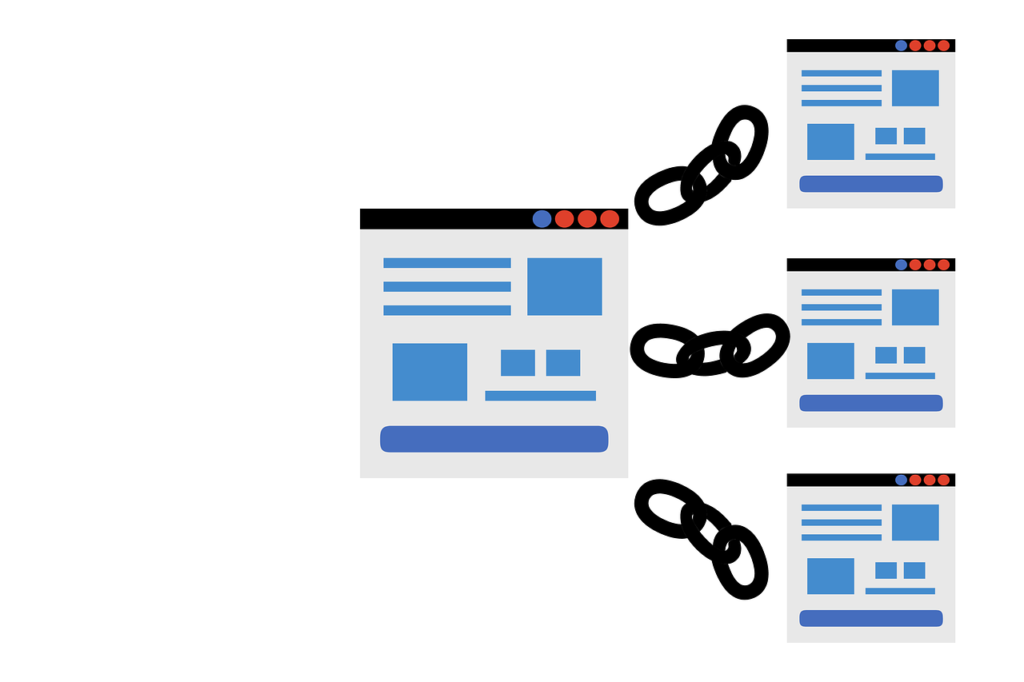
Here are a few ways that you can generate links for your website:
Write Guest Blog Posts
This is a great way to get your name and website out there. Ensure you only guest blog for websites relevant to your industry and include a link to your website in your author bio. It’s a great way to promote expertise and earn quality white-hat links.
Articles Submissions To Online directories And Magazines
It’s a great way to get exposure for your website and build links simultaneously. When you submit an article, include a link to your website in the bio or the article’s content.
Create A Resource Page And Get Backlink From Other Websites
This is a great way to build relationships with other website owners and get links. When you create a resource page, include links to websites you think would be helpful for your visitors.
Comment On Blogs
When you comment on a well-written and informative blog, include a link to your website. This will show the blog owner that you are an expert in your field and may lead to a guest blogging opportunity. This is a great way to get your name and website out there.
Reach Out To Bloggers And Ask For Link Insertion In Their Next Post
This is a great way to get mentioned on a relevant blog. Reaching out to a blogger with your expertise will show the blogger that your website is authoritative in that particular field and may lead to generating quality traffic.
Submit Press Releases To Online News Outlets
This method might be challenging to get links from high-authority websites, but submitting your press release on popular news websites will improve your website’s SEO.
Mention Other Businesses On Social Media And Include A Link To Their Website
When you mention another business on social media, include a link to their website. This will show them you are interested in promoting their business and may lead them to reciprocate the favor. It’s a great way to build relationships with other businesses and get your name out there.
Collaborate With Other Businesses On Joint Projects And Cross-Promote Each Other’s Work
When collaborating with another business on a joint project, promote their work on your website and social media channels. This will show them you are interested in promoting their business and may lead them to reciprocate the favor. This is a great way to build relationships with other businesses simultaneously.
Host An Event Or Webinar And Promote It Online
Hosting an event or webinar is a great way to get exposure for your website and build links simultaneously. By promoting your event or webinar online, you assure the audience that your product or services will succeed, which will help us promote our website online and generate traffic.
Give Away Free Samples Of Your Product Or Service
This is a great way to promote your product or ser and get people talking about it. When you give away free samples about your product or service, you assure the audience to trust it, that the service fails, and their chances of improving your website’s SEO.
Optimize Your Website For Local Search
When optimizing your website for local search, include your city and state in your keywords. This will help you rank higher in search results for people who are searching for businesses/services in your area. It’s a great way to get your website in front of people searching for businesses like yours.
Add Social Sharing Buttons
This is a great way to get your content shared on social media. When you add social sharing buttons to your website, include Twitter, Facebook, and LinkedIn. This will help you get more shares and build links simultaneously.
Create Infographics
Creating Infographics is one of the best ways to get people to share your content. When you create an infographic, you link back to your website, which will help you get more shares and build links simultaneously.
Online Q&A Sessions
Participating in an online Q&A session shows the organizer that you are an expert in your field, which may lead to a guest blogging opportunity. Online Q&A sessions are also a great way to get exposure for your website.
Create Free Tools
Creating free tools increases your chances of getting links from high-authority websites. People will see your tool as applicable and want to share it with others. The best way to do this is by linking to your website.
Broken Link Building
It’s the best way to get high-quality links from websites relevant to your niche. When you find a broken link on a website, you can contact the webmaster and let them know about your website. They will usually happily replace the link to your website with one.
Stealing Competitor’s Backlink
One of the best ways to get links from high-authority websites is to steal your competitor’s backlink. This can be done by using a tool like Ahrefs. Once you have found your competitor’s backlink, you can contact the website owner and ask them to replace the link with one to your website, as you might have a higher authority than the competitors.
Earning Link
It is the most complex and time-consuming way to get links and the most rewarding. When you earn a link, you show the website owner your website is worth linking to. You can do this by creating great content, infographics, or tools that people will want to share.
Types Of Linkable Content
- Blog posts
- How-to guides
- Infographics
- Free tools
- ebooks
- Whitepapers
- Case studies
- Webinars
These are some of the ways to create linkable content. If you can create high-quality, informative, and engaging content, people will be more likely to link to your website. And the more links you have, the more your website will rank in search results.
Conclusion
Link building is integral to SEO and should be part of your marketing strategy. There are many ways to build links, but not all links are equal. Building high-quality links from websites relevant to your niche would be best. You need to continue building links and promoting your website to see results. Feel free to contact me if you need help with your link-building. I’m happy to help. Thanks for reading! We hope your query for ‘How To Do Link Building For A Website’ is resolved. Did you like this article? Please share it with your friends! Also, if you have any questions or comments, leave them below, and I will happily answer them. Remember to subscribe to my blog for more great link-building articles.

